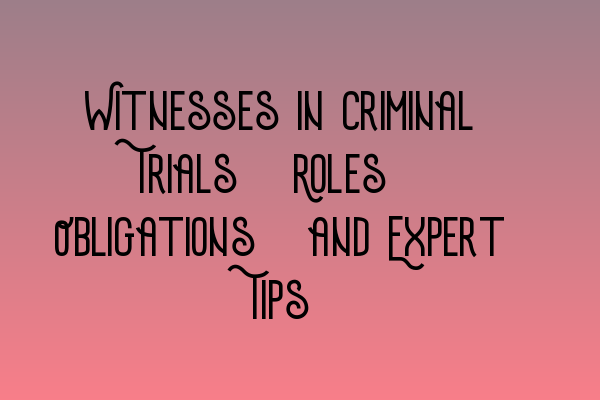Witnesses in Criminal Trials: Roles, Obligations, and Expert Tips
When it comes to criminal trials, witnesses play a crucial role in the pursuit of justice. They are individuals who have witnessed or have relevant information about the crime at hand. Witnesses can greatly influence the outcome of a case, which is why their roles and obligations are of utmost importance. In this article, we will delve into the various aspects of witnesses in criminal trials and provide expert tips to help them fulfill their obligations effectively.
Roles of Witnesses:
Witnesses in criminal trials have several important roles to fulfill. They are responsible for providing firsthand accounts of the events they have witnessed. These accounts contribute to the establishment of facts and help the court reach a fair and just verdict. The key roles of witnesses include:
- Presenting factual information: Witnesses are obligated to provide accurate and truthful accounts of the events they have witnessed. Their testimonies are crucial in establishing the sequence of events and identifying the parties involved.
- Supporting evidence: Witnesses may possess physical evidence or documentation that can support their testimonies or provide additional context to the court.
- Identifying suspects or perpetrators: Witnesses who have seen the crime being committed can help identify the individuals responsible. Their identification is essential for the prosecution to build a strong case.
- Corroborating or challenging other evidence: Witnesses can confirm or dispute the evidence presented by other parties involved in the trial. Their input can influence the credibility and reliability of the evidence.
Obligations of Witnesses:
Witnesses in criminal trials have certain obligations they must fulfill. These obligations are essential to ensure fairness, transparency, and the overall integrity of the legal process. The primary obligations include:
- Truthful testimony: Witnesses must provide truthful and accurate information to the court. Lying or withholding crucial information is a serious offense that can lead to legal consequences.
- Attending court proceedings: Witnesses are required to attend court proceedings to provide their testimonies. Failing to appear without a valid reason can result in legal penalties.
- Cooperating with investigations: Witnesses have a duty to cooperate with law enforcement agencies and legal teams. This includes providing statements, attending interviews, and responding to requests for further information.
- Protection of witness identity: In certain cases, witnesses may require protection of their identity to ensure their safety. This includes providing testimonies anonymously or under special circumstances.
Expert Tips for Witnesses:
Being a witness in a criminal trial can be a daunting experience. To navigate the process effectively, here are some expert tips for witnesses:
- Prepare yourself: Before testifying, thoroughly review your statements and any evidence you possess. Familiarize yourself with the facts of the case to ensure accurate and coherent testimonies.
- Be truthful and concise: Stick to the facts and avoid speculation or assumptions. Answer questions truthfully and directly, without providing unnecessary details or opinions.
- Remain calm and composed: It is natural to feel nervous in court, but try to stay calm and composed. Maintain a professional demeanor to strengthen the credibility of your testimony.
- Ask for clarification: If you don’t understand a question or need further clarification, don’t hesitate to ask. It is important to provide accurate answers to avoid any misunderstandings.
- Protect your safety: If you have concerns about your safety, inform the authorities or the legal team. They can take appropriate measures to ensure your protection during and after the trial.
Conclusion
Witnesses are essential participants in criminal trials, as their testimonies can greatly impact the outcome of a case. By understanding their roles, obligations, and following expert tips, witnesses can effectively contribute to the pursuit of justice. If you are called to be a witness, it is essential to seek legal guidance and understand the process thoroughly. To learn more about the complexities of criminal law, legal representation, and related topics, feel free to explore the following articles:
- Legal Representation for Delaware LLCs in the UK: Expert Advice
- Ensuring Ethical Business Practices: Delaware’s Code of Conduct
- Legal Challenges for UK Businesses in the U.S.: Strategies for Overcoming Hurdles
- UK Criminal Law: An In-Depth Analysis of the British Legal System
- Legal Challenges for UK Businesses in the U.S.: Strategies for Overcoming Hurdles
